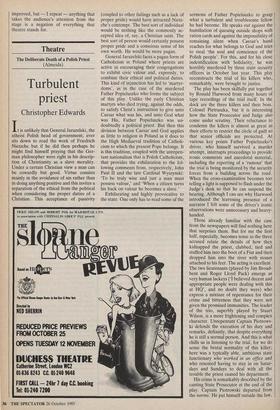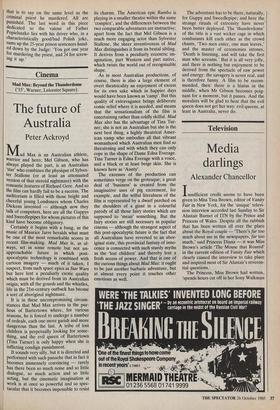Theatre
The Deliberate Death of a Polish Priest (Almeida)
Turbulent priest
Christopher Edwards It is unlikely that General Jaruzelski, the atheist Polish head of government, ever sits down to read the work of Friedrich Nietzche but if he did then perhaps he might find himself praying that the Ger- man philosopher were right in his descrip- tion of Christianity as a slave morality. Under a certain Christian view a man can be cowardly but good. Virtue consists mainly in the avoidance of sin rather than in doing anything positive and this invites a separation of the ethical from the political when considering the proper duties of a Christian. This acceptance of passivity (coupled to other failings such as a lack of proper pride) would have attracted Nietz- che's contempt. The best sort of individual would be nothing like the commonly ac- cepted idea of, say, a Christian saint. The best sort of person would certainly possess proper pride and a conscious sense of his own worth. He would be more pagan.
General Jaruzelski faces a pagan form of Catholicism in Poland where priests are active in encouraging their congregations to exhibit civic valour and, expressly, to combine their ethical and political duties. This kind of injunction has led to 'martyr- doms', as in the case of the murdered Father Popieluszko who forms the subject of this play. Unlike the early Christian martyrs who died trying, against the odds, to satisfy Christ's instruction to give unto Caesar what was his, and unto God what was His, Father Popieluszko was un- doubtedly a political priest. But then this division between Caesar and God applies as little to religion in Poland as it does to the High Mediaeval tradition of Catholi- cism to which the present Pope belongs. It is this tradition, coupled with the unrepen- tant nationalism that is Polish Catholicism, that provides the exhilaration to the fol- lowing comments from, respectively, John Paul II and the late Cardinal Wyszynski: `To be truly wise and just a man must possess valour,' and 'When a citizen turns his back on valour he becomes a slave.'
Exhilarating and highly provocative to the state. One only has to read some of the sermons of Father Popieluszko to grasp what a turbulent and troublesome fellow he had become. He speaks out against the humiliation of queuing outside shops with ration cards and against the impossibility of remaining silent when Caesar's hand reaches for what belongs to God and tries to steal 'the soul and conscience of the Polish people'. For this, and for his close indentification with Solidarity, he was horribly murdered by three state security officers in October last year. This play reconstructs the trial of his killers who, remarkably, were brought to justice.
The play has been skilfully put together by Ronald Harwood from many hours of tape recordings of the trial itself. In the dock are the three killers and their boss, Colonel Pietruszka, but it is interesting how the State Prosecutor and Judge also come under scrutiny. Their reluctance to condemn the killers is almost as great as their efforts to restrict the circle of guilt so that senior officials are protected. At various key points Father Popieluszko's driver, who himself survived a murder attempt, interrupts proceedings to provide ironic comments and anecdotal material, including the reporting of a 'rumour' that the trial is being monitored by the security forces from a building across the road. When the cross-examination becomes too telling a light is supposed to flash under the Judge's desk so that he can suspend the hearing. Although I can see why Harwood introduced the leavening presence of a narrator I felt some of the driver's ironic observations were unnecessary and heavy- handed.
Those already familiar with the case from the newspapers will find nothing here that surprises them. But for me the first half, especially, becomes tense as the three accused relate the details of how they kidnapped the priest, clubbed, tied and stuffed him into the boot of a Fiat and then dropped him into the river with stones attached to his feet. The acting is excellent. The two lieutenants (played by Jim Broad- bent and Roger Lloyd Pack) emerge as very human lackeys CI believed decent and appropriate people were dealing with this at HQ', and no doubt they were) who express a mixture of repentance for their crime and bitterness that they were not given the promised immunities. The leader of the trio, superbly played by Stuart. Wilson, is a more frightening and complex character. Unrepentant Captain Piotrows- ki defends the execution of his duty and remarks, defiantly, that despite everything he is still a normal person. And this is what chills us in listening to the trial, for we do sense the brutal normality of this killer; here was a typically able, ambitious state functionary who worked in an office and who resented having to stay in on Satur- days and Sundays to deal with all the trouble the priest caused his department.
His crime is remarkably described by the canting State Prosecutor at the end of the play. Captain Piotrowski departed from the norms. He put himself outside the law, that is to say on the same level as the criminal priest he murdered. All are punished. The last word in this piece dedicated to the valour of Father Popieluszko lies with his driver who, in a characteristically good/bad Polish joke, sums up the 25-year prison sentences hand- ed down by the Judge: 'You got one year for murdering the priest, and 24 for screw- ing it up.'



























































 Previous page
Previous page